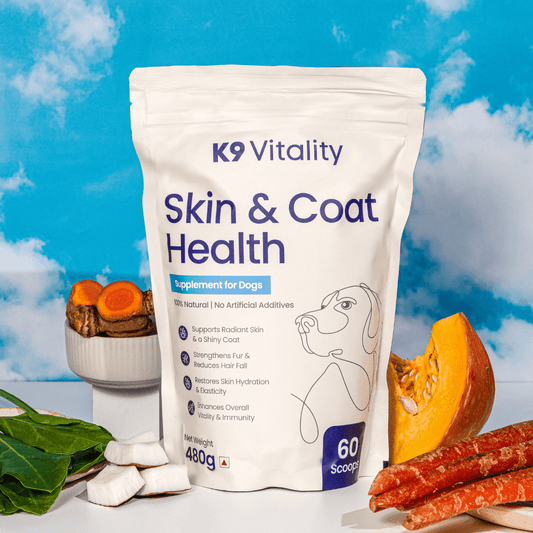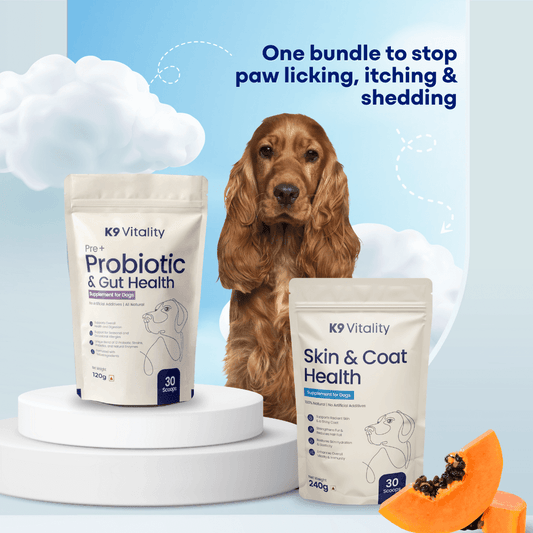
Probiotics for Dogs: A Complete Guide
Share
Introduction
Probiotics for dogs are like little helpers for their tummy. They can make dogs feel better and healthier. Even though we're still learning about them, we know they can do good things for dogs, like helping with digestion and keeping them safe from sickness. In this blog, we'll talk about what probiotics are, the different kinds for dogs, and how they can make your furry friend feel great. Let's explore this doggy world of probiotics together!
However, scientific research on the effectiveness of probiotics for dogs is somewhat limited, and the existing studies can sometimes yield conflicting results. Nevertheless, in specific situations, probiotics may provide various benefits for dogs, including:
- Aiding Digestion: Probiotics can assist in the digestion process, helping dogs break down and absorb nutrients more efficiently. This can be particularly useful for dogs with digestive issues.
- Modulating the Immune System: Probiotics have been shown to help regulate the immune system in dogs. A well-balanced immune system is crucial for overall health and disease prevention.
- Providing Intestinal Benefits: Probiotics produce short-chain fatty acids in the gut, which can combat harmful bacteria. This can contribute to a healthier intestinal environment.
- Improving Gastrointestinal Health: Dogs suffering from diarrhea, irritable bowel syndrome, or intestinal inflammation may find relief through the use of probiotics.
- Preventing Urinary Tract Infections: Probiotics could play a role in reducing the risk of urinary tract infections in dogs.
- Reducing Allergic Reactions: Probiotics may help decrease allergic reactions by reducing intestinal permeability and controlling inflammation.
- Promoting Calmness: Some research suggests that probiotics could contribute to a sense of calm in dogs.
Now, let's delve deeper into the world of probiotics for dogs, exploring what they are, the different types available, their advantages, and their potential applications.
What Are Probiotics for Dogs?
Probiotics consist of beneficial microorganisms residing in the digestive tract. These microorganisms, including bacteria and yeast, number in the billions within the gastrointestinal system of dogs. Their primary function is to maintain a healthy internal environment, warding off diseases and promoting well-being.
Gastrointestinal microorganisms perform various essential tasks, including:
- Facilitating the breakdown of food.
- Producing essential nutrients and vitamins.
- Defending against potential pathogens.
- Enhancing the immune system.
- Interacting with the "gut-brain axis," influencing mood and behavior.
Understanding Prebiotics
You may have also come across the term "prebiotics." What's the distinction between prebiotics and probiotics? Prebiotics are a type of dietary fiber that nourishes and fosters the growth of beneficial bacteria that already reside in the colon. In essence, prebiotics serve as food for probiotics. These fiber sources are commonly found in high-fiber foods.
Do Dogs Need Probiotics?
Normally, a healthy dog should be capable of maintaining a balanced population of digestive microbes without the need for probiotics. However, during times of stress, illness, or malnutrition, this microbial balance can be disrupted. Many dogs seem to respond positively to probiotic supplements when their gut microbes become imbalanced.
Types of Probiotics for Dogs
Probiotics for dogs are available in various forms. Some dog food products even include probiotics as part of their ingredients, such as Purina Pro Plan Complete Essentials and Blue Buffalo True Solutions Blissful Belly. You can identify the specific bacteria strains added by checking the guaranteed analysis section on the dog food packaging.
However, it is often more effective to administer probiotics to dogs in the form of supplements, such as powders, capsules, or chews. These products typically provide higher quantities of beneficial live microorganisms. The probiotic supplement will come with recommendations regarding dosage and frequency of use.
Species-specific strains of probiotics for dogs include Enterococcus faecium and Bacillus coagulans. Other types that have proven beneficial for dogs include Bifidobacterium animalis, Bifidobacterium longum, Lactobacillus acidophilus, and Lactobacillus rhamnosus.
Benefits of Probiotics for Dogs
Studies have indicated that certain species of probiotics may offer specific advantages for dogs. For instance, particular strains of Lactobacillus and Bifidobacterium have shown promise in:
- Managing yeast issues and supporting the immune system.
- Alleviating anxiety and reducing stress.
- Providing relief from diarrhea and food allergies.
- Supporting the immune response in some Bacillus species.
- Shortening the duration of diarrhea in dogs through Enterococcus faecium.
K9 Vitality Probiotics for dogs

Discover the secret to a happier, healthier dog with Pre+ Probiotics for Dogs. Tackle allergies, boost gut health, and optimize nutrient absorption for your furry companion. This easy-to-use, delicious probiotic powder will have your dog wagging their tail with newfound energy and vitality. Say goodbye to discomfort and hello to a thriving, allergy-free dog. Order now to witness the transformation in your four-legged family member's life with probiotics for dogs.
Can Probiotics Help with Dog Diarrhea?
Yes, probiotics can be beneficial in addressing dog diarrhea caused by various factors, including:
- Stress stemming from changes in routine or environment.
- Sudden dietary alterations, such as introducing new or unusual foods.
- Imbalances resulting from prolonged antibiotic use.
- Diarrhea linked to infections that lead to bacterial overgrowth in the gut.
Are Probiotics Suitable for Puppies?
Absolutely, puppies can benefit from dog-specific probiotics. These supplements may assist in establishing a balanced population of intestinal bacteria, fostering a robust immune system, and reducing the occurrence of digestive tract issues like diarrhea and constipation.
Can Dogs Consume Human Probiotics?
Yes, dogs can safely consume human probiotics without harm. However, it's important to note that human probiotics may not deliver the same benefits as species-specific supplements designed for dogs. Dog-specific probiotics take into account the distinct gut microbiome of dogs, providing appropriate dosing instructions on their labels.
Incorporating Probiotic Foods into a Dog's Diet
Certain human foods, such as yogurt, kefir, and fermented vegetables like sauerkraut, contain live cultures that may offer benefits to some dogs. Nevertheless, introducing new foods into a dog's diet can sometimes lead to digestive issues, including diarrhea. Therefore, it's generally safer to utilize probiotic supplements.
When considering probiotic foods for dogs, it's crucial to:
- Opt for plain, unsweetened varieties.
- Avoid products containing artificial sweeteners, particularly xylitol, which is toxic to dogs.
- Limit the quantity of probiotic foods according to the following guidelines:
- 1 teaspoon per day for small dogs.
- 2 teaspoons per day for medium-sized dogs.
- 3 teaspoons per day for large dogs or giant breeds.
Potential Side Effects of Probiotics for Dogs
While many dogs tolerate probiotics well, some may experience side effects when initiating probiotic use, particularly at high doses. These side effects might include:
- Digestive discomfort.
- Diarrhea.
- Bloating.
- Gas.
- Constipation.
It's important to note that digestive symptoms may temporarily worsen before improving when starting probiotics. If you have concerns about your dog's digestive health or their response to probiotics, consult your veterinarian.
Understanding Probiotics for Dogs
In conclusion, probiotics for dogs represent a promising avenue for enhancing canine health. While scientific research continues to uncover the full extent of their benefits, these microorganisms show significant potential in aiding digestion, bolstering the immune system, and fostering a balanced gut environment.
Whether you choose probiotic supplements specifically designed for dogs or incorporate probiotic-rich foods into their diet, it's essential to prioritize your dog's digestive health. By doing so, you can contribute to their overall well-being and ensure they enjoy a happy and healthy life.






